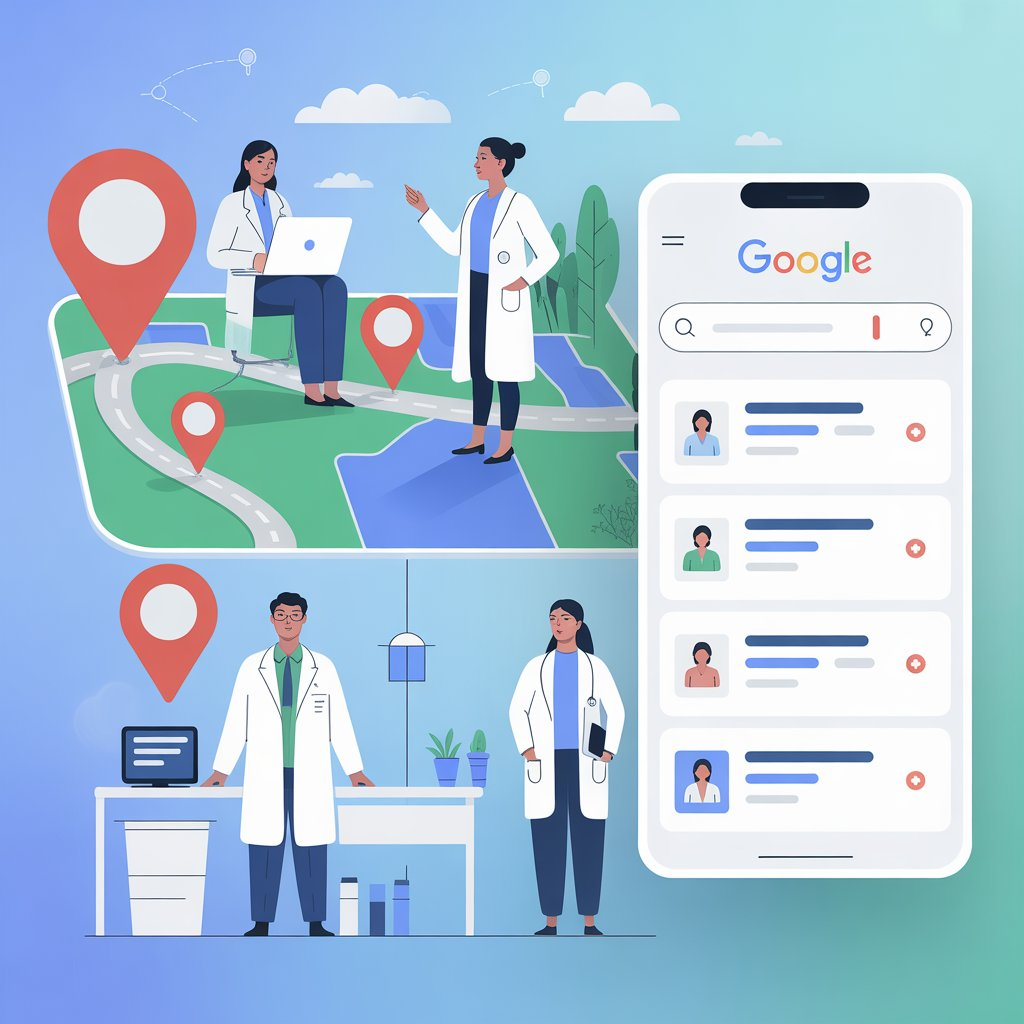Local SEO for Healthcare Providers: Attracting More Patients Near You

Introduction
In the competitive world of healthcare, visibility is everything. When a potential patient searches for “dentist near me” or “best pediatrician in [city name]”, will your clinic appear at the top of Google results?
That’s where local SEO for healthcare providers comes in. It’s the process of optimizing your online presence to attract more patients from nearby searches. In today’s mobile-driven world, where 76% of people use their phones to find local services, having a strong local SEO strategy isn’t just beneficial—it’s essential.
This guide will show you how to leverage local SEO to enhance visibility, establish trust, and increase patient appointments. Whether you run a private clinic, dental practice, or medical center, you’ll learn actionable strategies that deliver real results.
What Is Local SEO for Healthcare Providers?
Local SEO (Search Engine Optimization) focuses on improving your visibility in local search results—especially in Google Maps and the Local 3-Pack, which displays the top three nearby businesses relevant to a user’s query.
For healthcare providers, this means appearing when someone searches:
-
“family doctor near me”
-
“best eye specialist in Chicago”
-
“urgent care open now”
How It Works:
Local SEO uses:
-
Google Business Profile optimization
-
local keywords
-
online reviews
-
NAP consistency (Name, Address, Phone number)
-
local backlinks
When all these factors align, your healthcare practice appears at the top of local search results—exactly where your future patients are looking.
Why Local SEO Matters for Healthcare Providers
1. Patients Search Locally Before Booking
According to Google, 88% of patients use search engines to find healthcare providers in their area.
If your practice isn’t optimized for local searches, you’re missing out on dozens of daily appointment opportunities.
2. Builds Trust and Credibility
A well-optimized Google Business Profile (GBP) with photos, reviews, and updated hours shows potential patients that your practice is active, reliable, and patient-focused.
3. Increases Appointment Bookings
Local SEO brings qualified leads—people who are actively searching for healthcare services in your area. These users are far more likely to convert into patients than random website visitors.
4. Competes with Larger Hospitals
Even if you’re a small clinic or independent doctor, local SEO levels the playing field. Google rewards relevance and proximity, not just big budgets.
Core Elements of Local SEO for Healthcare Providers
1. Optimize Your Google Business Profile (GBP)
Your Google Business Profile (formerly Google My Business) is the foundation of local SEO success.
Steps to Optimize Your GBP:
-
Claim and verify your listing on Google Business Profile.
-
Use your exact clinic name—avoid keyword stuffing.
-
Add a complete address, phone number, and website link.
-
Upload high-quality photos (clinic exterior, staff, logo).
-
Choose relevant categories (e.g., “Family Doctor,” “Dental Clinic,” “Physiotherapy Center”).
-
Set accurate business hours, including holidays.
-
Encourage patients to leave reviews and respond to them professionally.
Pro Tip:
Add FAQs and service details (like “telemedicine available”) directly in your GBP description to help patients make quick decisions.
2. Use Local Healthcare Keywords
To attract local patients, use geo-targeted keywords throughout your site and content.
For example:
| Generic Keyword | Local SEO Version |
|---|---|
| dentist | dentist in New York |
| physiotherapist | physiotherapist near me |
| pediatric clinic | best pediatric clinic in Chicago |
| dermatologist | skin specialist in Houston |
Where to Include These Keywords:
-
Page titles and meta descriptions
-
Headings (H1, H2)
-
Service pages
-
Image alt text
-
Google Business Profile description
Use tools like Google Keyword Planner or Ahrefs to find trending “near me” and local intent keywords.
3. Ensure NAP Consistency
Your Name, Address, and Phone number (NAP) must be consistent across:
-
Website
-
Google Business Profile
-
Social media pages
-
Directories (Healthgrades, Zocdoc, Yelp)
Why it matters:
Google’s algorithm cross-verifies business details. Inconsistencies can lower your local ranking.
Tip:
Use the same phone number format everywhere (e.g., +1 (555) 123-4567).
4. Optimize On-Page SEO for Local Search
Beyond Google Maps, your website plays a huge role in local SEO success.
On-Page SEO Checklist:
-
Add your city and region in meta titles (e.g., “Pediatric Dentist in Austin | SmileCare Clinic”).
-
Include an embedded Google Map on your contact page.
-
Create dedicated service area pages (e.g., “Cardiology Services in Boston”).
-
Use schema markup for healthcare (see below).
-
Ensure mobile-friendliness and fast page load speed.
5. Leverage Healthcare Schema Markup
Schema markup helps Google better understand your content and display rich results.
Healthcare providers can use the MedicalOrganization or LocalBusiness schema.
Example:
{
"@context": "https://schema.org",
"@type": "MedicalClinic",
"name": "BrightSmile Dental Care",
"address": {
"@type": "PostalAddress",
"streetAddress": "123 Main Street",
"addressLocality": "Austin",
"addressRegion": "TX",
"postalCode": "78701"
},
"telephone": "+1-555-123-4567",
"url": "https://brightsmiledental.com"
}
Benefit:
Rich snippets can show ratings, service hours, and reviews directly in Google results—boosting CTR.
6. Get More Patient Reviews
Reviews are a major ranking and conversion factor in healthcare SEO.
Why Reviews Matter:
-
84% of people trust online reviews as much as personal recommendations.
-
Clinics with 4.5+ stars attract 70% more patients.
How to Get More Reviews:
-
Ask satisfied patients after appointments.
-
Send SMS or email review requests.
-
Provide direct Google review links.
-
Always respond politely to feedback—good or bad.
Pro Tip:
Use HIPAA-compliant tools for collecting feedback to ensure privacy compliance.
7. Create Localized Content
Publishing local-focused content establishes authority and improves your relevance for nearby searches.
Content Ideas for Healthcare Local SEO:
-
“5 Ways to Prevent Seasonal Allergies in Chicago”
-
“Best Pediatric Diet Tips for Dallas Families”
-
“How Our Clinic Supports Telehealth in San Diego”
-
“Flu Shot Awareness Month: What Local Patients Should Know”
Tip:
Include location mentions, local statistics, and community involvement to connect with readers.
8. Build Local Backlinks
High-quality local backlinks strengthen your domain authority and relevance.
Where to Get Them:
-
Local chambers of commerce websites
-
City directories or community blogs
-
Healthcare associations
-
Local sponsorships or events
Example:
If your clinic sponsors a local marathon, ask the event site to link to your homepage.
9. Optimize for Voice Search
Voice searches like “Find a doctor open now near me” are growing rapidly.
Voice Optimization Tips:
-
Use natural, conversational language.
-
Add FAQ sections on key pages.
-
Focus on question-based long-tail keywords.
-
Keep answers concise (40–60 words).
10. Monitor Local SEO Performance
Use these tools to track and refine your efforts:
| Tool | Purpose |
|---|---|
| Google Business Insights | Tracks calls, direction requests, and views |
| Google Analytics 4 (GA4) | Measures website traffic & conversions |
| Google Search Console | Tracks search impressions and mobile usability |
| BrightLocal / Moz Local | Monitors citations and rankings |
Local SEO Strategies by Healthcare Specialty
| Healthcare Type | Local SEO Tip |
|---|---|
| Dentists | Create separate pages for cosmetic, pediatric, and emergency services. |
| Clinics / Hospitals | Add Google Maps directions and a “Book Appointment” CTA. |
| Chiropractors | Publish local blog posts on back health awareness events. |
| Therapists | Optimize for long-tail searches like “anxiety therapist near me”. |
| Urgent Care Centers | Highlight hours (“Open 24/7”) and use schema for real-time updates. |
Common Local SEO Mistakes to Avoid
| Mistake | Impact | Solution |
|---|---|---|
| Inconsistent NAP | Confuses Google and patients | Use same info everywhere |
| Ignoring Reviews | Hurts reputation | Encourage patient feedback |
| Slow Website | Higher bounce rate | Compress images & optimize hosting |
| Missing Schema | Missed ranking opportunities | Implement local schema markup |
| No Mobile Optimization | Lower local ranking | Use responsive design |
Future of Local SEO in Healthcare (2025 and Beyond)
-
AI-Powered Search Results: Google’s AI algorithms now prioritize personalization and proximity.
-
Zero-Click Searches: Optimize your GBP to appear in info-rich panels without needing clicks.
-
Voice Search Dominance: 50% of local searches are expected to be voice-based by 2026.
-
Patient Experience Signals: Appointment booking integration and real-time chat support will influence local ranking.
FAQs on Local SEO for Healthcare Providers
1. How long does it take to see local SEO results?
Typically, you’ll start seeing noticeable improvements within 3–6 months, depending on competition and content consistency.
2. Can healthcare providers use paid ads with local SEO?
Yes! Combining Google Ads (Local Services) with SEO delivers faster results and boosts visibility in both paid and organic listings.
3. How can I improve my clinic’s ranking in Google Maps?
Focus on reviews, photo uploads, accurate NAP, and keyword-rich service descriptions in your Google Business Profile.
Conclusion
For healthcare providers, local SEO is the heartbeat of online patient acquisition. It ensures that when people search for nearby medical services, your practice stands out with credibility, convenience, and compassion.
By optimizing your Google Business Profile, maintaining NAP consistency, building local backlinks, and creating location-based content, you can significantly improve visibility—and ultimately, grow your patient base.
- Jocuri
- Religion
- Party
- Networking
- Music
- Literature
- Art
- Health
- Gardening
- Shopping
- Food
- Fitness
- Film
- Drinks
- Dance
- Crafts
- Causes
- Wellness
- Devotional Reflections
- Bible Study & Scripture Insights
- Prayer & Worship
- Christian Living
- Spiritual Growth & Discipleship
- Testimonies & Personal Journeys
- Christian Theology & Doctrine
- Church Calendar & Liturgical Seasons
- Christian Service & Mission
- Gardening
- Health
- Home
- Literature
- Networking
- Alte



